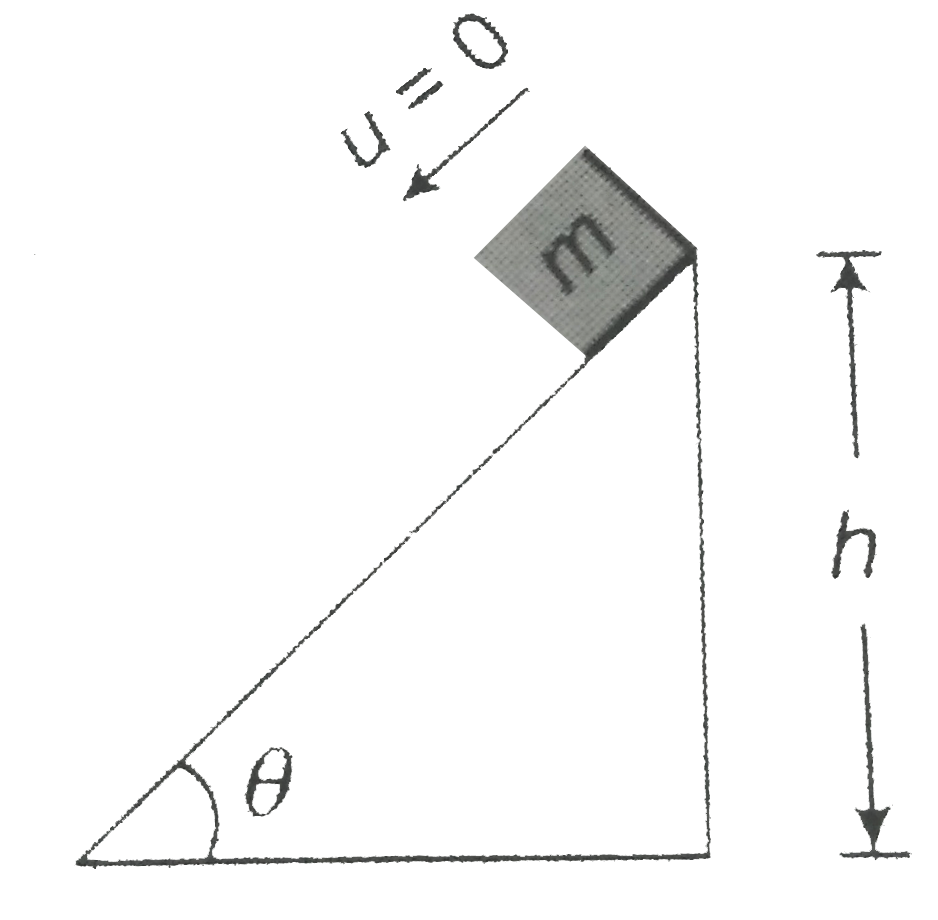A block moves down a smooth inclined plane of inclination θ. Its velocity on reaching the bottom is v. If it slides down a rough inclined plane of some inclination, its velocity on reaching the bottom is v/n, where n is a number greater than 0. The coefficient of friction is given by -
μ=tanθ(1−1n2)
μ=cotθ(1−1n2)
μ=tanθ(1−1n2)1/2
μ=cotθ(1−1n2)1/2
The correct Answer is:A
Step by step video, text & image solution for A block moves down a smooth inclined plane of inclination theta. Its velocity on reaching the bottom is v. If it slides down a rough inclined plane of some inclination, its velocity on reaching the bottom is v/n, where n is a number greater than 0. The coefficient of friction is given by - by Physics experts to help you in doubts & scoring excellent marks in Class 12 exams.
Updated on:21/07/2023Topper's Solved these Questions
Similar Questions
A block is released on an smooth inclined plane of inclination θ. After how much time it reaches to the bottom of the plane?

View SolutionA block is kept on a inclined plane of inclination q of length l. The velocity of particle at the bottom of inclined is (the coefficient of friction is μ
View Solution
Knowledge Check
A block moves down a smooth plane of inclination θ. Its velocity on reaching the bottom is v. If it slides down a rough inclined plane some inclination, its velocity on reaching the bottom is v/n, where n is a number greater than 0. The coefficient of friction is given by:
Aμ=tanθ(1−1n2)Bμ=cotθ(1−1n2)Cμ=tanθ(1−1n2)1/2Dμ=cotθ(1−1n2)1/2A block moves down a smooth inclined plane of inclination 45∘. Its velocity on reaching the bottom is v. If it slides down a rough inclined plane of same inclination, its velocity on reaching the bottom is vin, where n is a number greater than zero. The coefficient of friction μ is given by
Aμ=(1−1n)Bμ=(1−1n2)Cμ=√1−1n2Dμ=√1−1nAn object is placed on the surface of a smooth inclined plane of inclination θ. It takes time t to reach the bottom. If the same object is allowed to slide down a rough inclined plane of inclination θ, it takes time nt to reach the bottom where n is a number greater than 1. The coefficient of friction μ is given by:-
Aμ=tanθ(1−1n2)Bμ=cotθ(1−1n2)Cμ=tanθ√1−1n2Dμ=cotθ√1−1n2
An object is placed on the surface of a smooth inclined plane of inclination . It takes time t to reach the bottom of the inclined plane. If the same object is allowed to slide down rough inclined plane of same inclination , it takes time nt to reach the bottom where n is a number greater than 1. The coefficient of friction is given by -
View SolutionA block is released from the top of an inclined plane of inclination θ. Its velocity at the bottom of plane is v. If it slides down a rough inclined plane of the same inclination , its velocity at bottom is v/2. The coefficient of friction is
View SolutionAn object is placed on the surface of a smooth inclined plane of inclination . It takes time t to reach the bottom of the inclined plane. If the same object is allowed to slide down rough inclined plane of same inclination , it takes time nt to reach the bottom where n is a number greater than 1. The coefficient of friction is given by -
View SolutionA block of mass M slides down a rough inclined surface of inclination θ and reaches the bottom at speed at 'v' . However , if it slides down a smooth inclined surface of same length and same inclination , it reaches the bottom with the speed kv. Coefficient of friction between the block and the rough incline is :
View SolutionA block released from rest from the top of a smooth inclined plane of inclination 45∘takes time 't' to reach the bottom . The same block released from rest , from top of a rough inclined plane of same inclination , takes time '2t' to reach the bottom , coefficient of friction is :
View Solution
